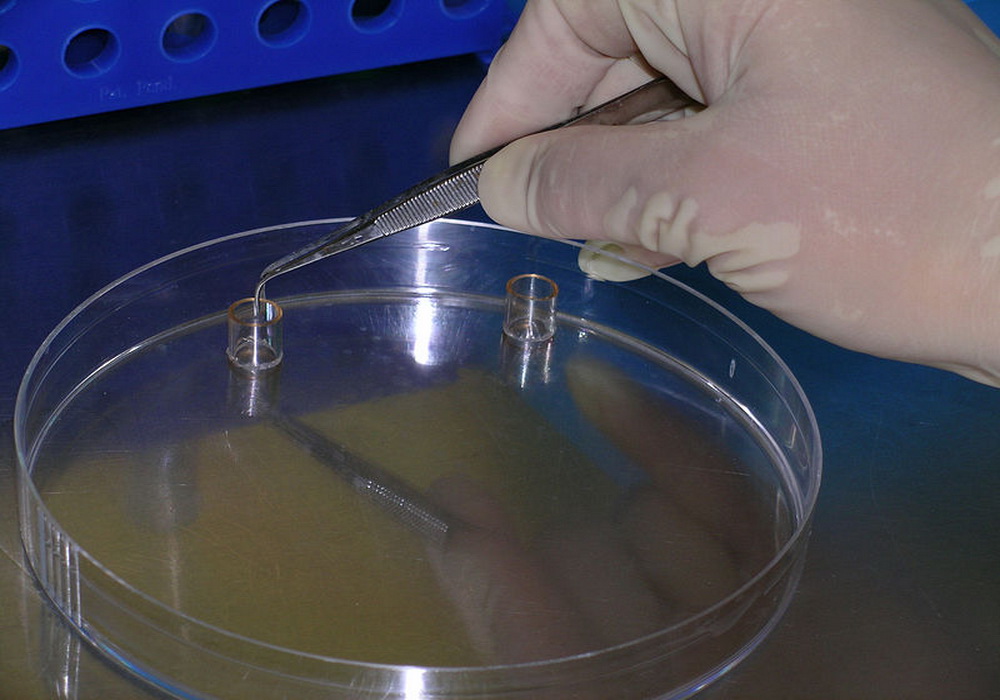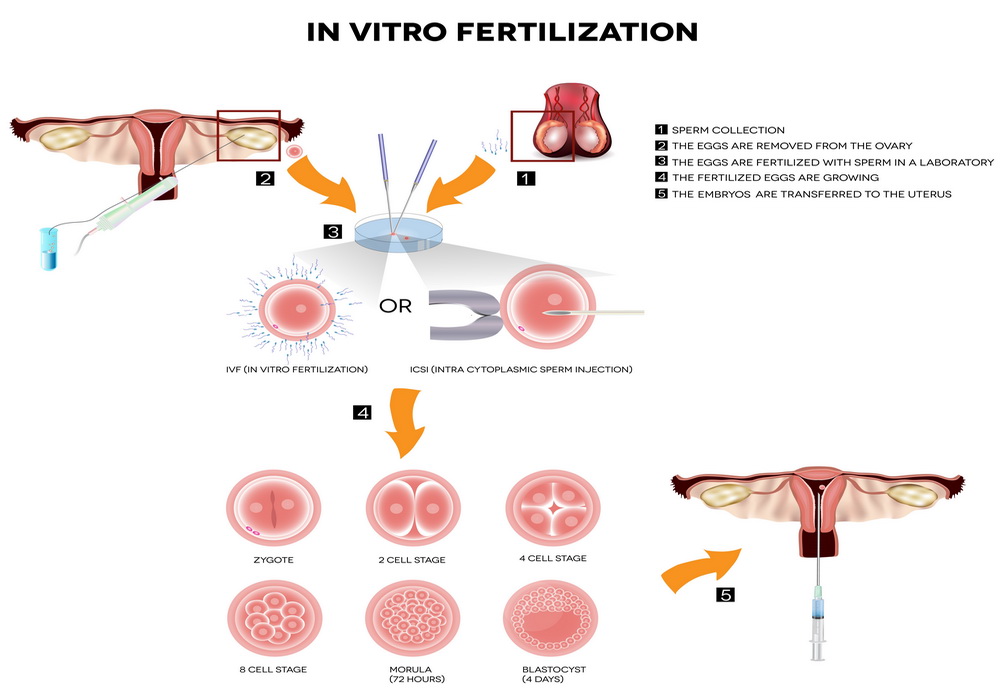
In Vitro Fertilization General Info
Invitro Fertilization — commonly referred to simply as IVF — is an artificial reproductive technique in which egg and sperm are joined together in a petri dish. IVF requires the use of hormones to stimulate the maturation of multiple eggs at once, after which they are extracted from the body. Once fertilization occurs in a lab setting, one or more created embryos are introduced to the woman's uterus, where they will hopefully implant to create a healthy pregnancy. IVF is a complex and expensive fertility treatment, so it's never the first option. It does offer the very real hope of having a baby to large numbers of couples who do not have another way to get pregnant.
- Important notification about information and brand names used in this slideshow!
- Photo courtesy of Jacopo Werther by Wikimedia Commons : commons.wikimedia.org/wiki/File:Human_cell-line_colony_being_cloned_in_vitro_through_use_of_cloning_rings.jpg
- www.webmd.com/infertility-and-reproduction/guide/in-vitro-fertilization
- http://www.britishfertilitysociety.org.uk/public/factsheets/keyfacts.html
- http://www.parents.com/getting-pregnant/infertility/treatments/in-vitro-fertilization-infertility-myths-facts/#page=2
- http://www.inviafertility.com/blog/infertility/drvkarande/top-ten-interesting-facts-about-in-vitro-fertilization-and-tubal-pregnancy

IVF Procedure
Injectable fertility drugs that stimulate your body to produce multiple eggs are the first step for a woman who is about to undergo IVF treatment. Expect lots of medical appointments to test if your eggs are ready to be retrieved. Before retrieval, you'll be given yet another drug that matures your eggs and kick starts ovulation. After egg retrieval — which takes up to an hour — the eggs will be combined with sperm. The embryos will constantly be monitored, and one or more healthy embryos will be chosen for transfer, usually at three or five days old. You'll have to take it easy after the transfer procedure. Two weeks later, you'll know if you are pregnant.
- Important notification about information and brand names used in this slideshow!
- Photo by shutterstock.com

Infertility Issues
Did you know that only five percent of couples who struggle with infertility end up having IVF? Not everyone who is infertile needs IVF, and not everyone is a good candidate either. Invitro fertilization may help you (or your partner) get pregnant if: - You have endometriosis, a condition in which the tissues that normally line the uterus also grow in other parts of the reproductive system. - You have blocked fallopian tubes. - You have problems with your uterus. - You have an ovulation disorder. - You have hostile cervical mucus. - Your partner has a low sperm count. - You have idiopathic (unexplained) infertility and other fertility treatments did not work.
- Important notification about information and brand names used in this slideshow!
- Photo courtesy of Ktoine by Flickr : www.flickr.com/photos/ktoine/8317892380

Who Is A Good Candidate For IVF?
IVF is an option for couples or individual women with fertility problems such as endometriosis, blocked fallopian tubes, a low sperm count, or unexplained infertility, or for people who are going to participate in gestational surrogacy. IVF (without an egg donor) is not an option for women who cannot produce healthy eggs, or for post-menopausal women. The success rates rapidly decline after a woman reaches 40 — age is still the number one cause of infertility. IVF is an option for men with very low sperm counts, but intracytoplasmic sperm injection (ICSI) will be required. ICSI is a procedure in which one sperm cell is injected directly into an egg cell.
- Important notification about information and brand names used in this slideshow!
- Photo courtesy of mrhayata by Flickr : www.flickr.com/photos/mrhayata/806038182/

IVF Success Rates
Before you have IVF, you will want to know what your chances of success are. The odds of ending up with a baby after IVF depend on a large number of factors. Those include the cause of your infertility, your age, and the quality of your specific fertility clinic. Overall, just over 29 percent of women who have IVF in the United States will get pregnant, and just over 22 percent will have a live baby. Ask your fertility clinic what their success rates are for women of your age and women with your fertility problem to gain a more complete picture of your odds of success.
- Important notification about information and brand names used in this slideshow!
- Photo courtesy of J.K. Califf by Flickr : www.flickr.com/photos/emerycophoto/2892182827/

Limiting factors (costs, age, multiple births, etc)
Keep in mind that IVF is not a magic treatment that will work for everyone. Success rates are actually quite low for women beyond their late thirties. IVF success rates are actually improving all the time, but there is never a guarantee. IVF is also hugely expensive, and it may or may not be covered by your insurance policy. Another thing you want to consider is the impact the procedure might have on your health, and that of your baby. New research showing that IVF and the fertility drugs that are used impact both mothers and babies is slowly starting to appear, and everyone who is considering IVF should conduct their own risk assessment. Finally, how many embryos are you going to have implanted? Multiple pregnancies are more risky than singleton pregnancies. Are you willing to live with those risks, or would you consider selective reduction? If the answer to both questions is no, you will want to look into single-embryo IVF.
- Important notification about information and brand names used in this slideshow!
- Photo courtesy of 401(K) 2012 by Flickr : www.flickr.com/photos/68751915@N05/6757867273/

How To Gain Control Over Your IVF Cycle
IVF is a highly invasive fertility treatment that comes with physical side effects associated with the fertility drugs that are used, and it's an emotional roller coaster too. Educating yourself about all the small details of the procedure and how you will be feeling will prepare you for your first IVF cycle. Ask your medical team as many questions as you would like, but also seek contact with women who have already been there. Online discussion boards like the one here at SteadyHealth enable you to find women who have already had IVF and you are happy to share their experiences with you.
- Important notification about information and brand names used in this slideshow!
- Photo courtesy of Rhoda Baer by Wikimedia Commons : commons.wikimedia.org/wiki/File:Doctor_and_couple_talking_(1).jpg

Reduce Stress And Relax
Does being less stressed and more relax actually increase your chances of IVF success? Studies show mixed results on that one. What we do know is that stress-management techniques will help you feel better during your treatment. Remember to eat a healthy and balanced diet, exercise regularly (except after egg retrieval and embryo transfer), seek out support, and practice meditation or other relaxation techniques. You may also want to participate in counseling sessions during your treatment, so that you can sort through your emotions with the help of a professional.
- Important notification about information and brand names used in this slideshow!
- Photo courtesy of Visit St. Pete/Clearwater by Flickr : www.flickr.com/photos/visitstpeteclearwater/8120183699/

Myth: Herbal Remedies Can Help With IVF
Some people will advise you to use herbal concoctions to increase your chances of becoming pregnant through IVF. Before you buy into this myth, consider the fact that there is zero research that shows herbs to safe during IVF treatment. There is even a chance that herbal remedies can interact with the fertility drugs you will be taking during your cycles. One Danish study even shows that women who used herbal treatments during their IVF cycles reduced their chances of pregnancy by a whopping 30 percent. The moral of the story is clear: IVF is much more serious than a cold. Don't experiment with things that won't help and might harm, and simply follow your doctor's advice.
- Important notification about information and brand names used in this slideshow!
- Photo courtesy of Cara Faus by Flickr : www.flickr.com/photos/39794839@N03/5086436222/

Myth : Special Diets Can Boost Your Chances Of Getting Pregnant
Another IVF myth is the idea that certain special diets can boost your chances of getting pregnant. It's absolutely true that women who eat a healthy and balanced diet, and who do not have nutritional deficiencies, have an edge. Being at a healthy weight or at least close to a healthy weight is also going to help those odds. Going gluten free, or RAW, or eating large quantities of pineapple? Not so much. Just use common sense, and you'll be fine. Women who have special dietary requirements, due to food allergies or gastrointestinal disorders for example, should consult their medical team for dietary advice.
- Important notification about information and brand names used in this slideshow!
- Photo courtesy of Pedro Figueiredo by Flickr : www.flickr.com/photos/pfig/130921995/


_f_280x120.jpg)
























Your thoughts on this
Loading...